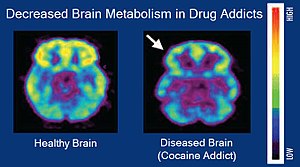Adiksyon
An adiksyon iyo an sarong neurosikolohikong disorder na karakterisado kan sarong persistent asin makuring urge na gumamit nin sarong droga o makisumaro sa sarong gawe na nagpoprodusir nin natural reward, sa ibong kan substantial na danyos asin iba pang negatibong consequences. An pauru-utrong paggamit nin droga parating pigliliwat an punksyon kan hutok sa mga paagi na nagpapadagos kan craving, asin pigpapaluya an (alagad does not completely negate) self-control.[1] An ngangalasan na ini – mga drogang pigliliwat an korte punksyon kan hutok – naggiya pasiring sa pagkasabot kan adiksyon bilang sarong brain disorder na igwa nin komplikadong variety nin psychosocial siring man sa neurobiological (asin kun kaya inboluntaryo) factors na pigpapasabot kan pag-urog kan adiksyon.[2][3][4]
| Addiction | |
|---|---|
| Mga ibang pangaran | Addictive behaviour (e.g. substance-use addiction, sexual addiction), dependence, addictive disorder, addiction disorder (e.g. severe substance-use disorder, gambling disorder) |
 | |
| Brain positron emission tomography images that compare brain metabolism in a healthy individual and an individual with a cocaine addiction | |
| Espesyalidad | Psychiatry, clinical psychology, toxicology, addiction medicine |
Kabali sa klasikong senyales kan adiksyon iyo an compulsive engagement sa rewarding stimuli, preoccupation na igwa nin substances o gawe, asin pinadagos an paggamit sa ibong kan negatibong consequences. An mga Habits asin patterns na asosyado sa adiksyon tipikal na karakterisado kan immediate gratification (short-term reward),[5][6] inubayan nin delayed deleterious effects (long-term costs).[3][7]
Kabali sa mga halimbawa kan substance addiction iyo an alcoholism, cannabis addiction, amphetamine addiction, cocaine addiction, nicotine addiction, opioid addiction, asin sa pagkakan o food addiction. An mga behavioral addictions mapupwedeng kabali an gambling addiction, shopping addiction, stalking, internet addiction, social media addiction, obsessive–compulsive disorder, video game addiction asin sexual addiction. An DSM-5 asin ICD-10 pigmimidbid sana an adiksyon sa pagsugal bilang behavioral addictions, alagad an ICD-11 pigmimidbid man an gaming addictions.[8]
Toltolan
baguhon- ↑ "Addiction as a brain disease revised: why it still matters, and the need for consilience". Neuropsychopharmacology 46 (10): 1715–1723. September 2021. doi:. ISSN 0893-133X. PMID 33619327. "pre-existing vulnerabilities and persistent drug use lead to a vicious circle of substantive disruptions in the brain that impair and undermine choice capacities for adaptive behavior, but do not annihilate them.".
- ↑ Error sa pag-cite: Imbalidong
<ref>tatak; mayong teksto na ipinagtao para sa reperensiya na pinagngaranan naCellular basis - ↑ 3.0 3.1 "Drugs, Brains, and Behavior: The Science of Addiction – Drug Misuse and Addiction". www.drugabuse.gov. North Bethesda, Maryland: National Institute on Drug Abuse. 13 July 2020. Retrieved 23 December 2021.
- ↑ Henden E (2017). "Addiction, Compulsion, and Weakness of the Will: A Dual-Process Perspective.". In Heather N, Gabriel S. Addiction and Choice: Rethinking the Relationship. Oxford, UK: Oxford University Press. pp. 116–132.
- ↑ "The disease of addiction: origins, treatment, and recovery". Disease-a-Month 54 (10): 696–721. October 2008. doi:. PMID 18790142.
- ↑ Error sa pag-cite: Imbalidong
<ref>tatak; mayong teksto na ipinagtao para sa reperensiya na pinagngaranan naNHM addiction-reward-reinforcement - ↑ "Addictive behaviors: etiology and treatment". Annu Rev Psychol 39: 223–52. 1988. doi:. PMID 3278676.
- ↑ "Gaming Addiction in ICD-11: Issues and Implications" (in en). Psychiatric Times. Psychiatric Times Vol 36, Issue 9 36 (9). 12 September 2019. Archived from the original on 3 March 2020. https://web.archive.org/web/20200303134538/https://www.psychiatrictimes.com/article/gaming-addiction-icd-11-issues-and-implications. Retrieved on 3 March 2020.